Opera Memphis’ Ned Canty wants to change the way you think about opera.
“I don’t want anybody to think I’m saying they’re wrong about opera,” he says. “But not every movie is a Hollywood movie. And when we talk about popular music, we might be talking about Beyoncé, Adele, or your favorite local garage band. It should be the same when we talk about opera. I only want to make a case that there’s a whole lot more to opera than most people have ever realized.”
Canty is making his best case yet for opera’s depth, breadth, and versatility this week. He’s closing his second season as general director for Opera Memphis with the first-ever Midtown Opera Festival, an ambitious new event at Playhouse on the Square.
Canty knows his work is cut out for him. He knows opera purists who aren’t interested in arias that aren’t sung in Italian and understands that, among the broader population, opinions about opera tend to be based more on the visual stylings of Bugs Bunny animator Chuck Jones than the musical compositions of Georges Bizet.
The festival features more singers than Opera Memphis has ever before imported at one time. It’s staged entirely by Canty — with music direction by Steven Osgood — and is built around a strong trio of modern chamber operas.
Lucretia, Child, and Eggleston
The Rape of Lucretia, by British composer Benjamin Britten, opens the weekend. It’s followed by an evening of quirky one-acts by American composer Lee Hoiby: This Is the Rill Speaking and Bon Appétit!, the Julia Child opera.
The three showcase pieces will be performed alongside a variety of smaller works, ranging from a children’s opera to a deliriously off-color and extremely adult new monodrama written specifically for the festival and inspired by Memphis’ iconic photographer William Eggleston.
Eggleston and Child won’t be the only atypical opera inspirations brought to life onstage over the weekend. There will be drunken, fornicating Etruscans, a nameless woman who’s in love with her van, fictional teenagers learning to masturbate, and a real American hero.
Britten and Hoiby are lyrically inclined 20th-century composers working in an era when dissonant and atonal compositions were in fashion. Admired for their technical skills, both men were largely underrated for making music considered by some as old-fashioned and out of step with modernity. In retrospect, “timeless” seems like the more appropriate adjective.
Britten’s The Rape of Lucretia, described by the composer as a “chamber opera,” was written immediately following WWII. There wasn’t much money for opera production, so the composer challenged himself to create a work for 13 instruments and a streamlined cast that could tour cheaply and still deliver the emotional payload of a traditional opera. Set in the period just prior to the founding of the Roman Republic, it tells stories of men behaving badly at war, of women behaving badly on the homefront, and of Lucretia, a woman whose rare chastity and abiding love for her husband became so famous it attracted the unwanted attention of an envious prince.
It’s kind of like there’s this war that’s always there,” says Abby Fischer, the contralto singing the role of Lucretia. “The sets are a little bit 500 B.C., which is when The Rape of Lucretia takes place. But it’s also kind of set in 1946, when Britten wrote the opera. And it’s also kind of right now, in the time we’re performing the opera. That’s what Ned’s going for as the director. It’s what the costume shop and scene shop are going for. And it’s really what Britten’s going for too, I think.”
“The Rape of Lucretia makes Tosca look like a Disney film,” Canty says, comparing his festival’s grim opening act to Puccini’s popular tragedy, with its famous depictions of torture, murder, and suicide. “It’s an intense piece, although it’s not graphic at all,” Canty says. “Everything that’s horrific happens offstage.”
Festival conductor Osgood advises listeners to pay attention to how Britten develops the instrumental voices in his limited orchestra like characters in the drama. “Every single player in the pit has a specific personality,” Osgood says. “Each one has a unique and distinctive sound that Britten deploys consistently to comment on the action.”
When asked why there are two Lee Hoiby pieces on the menu, Canty answers without hesitation: “Because I think Hoiby is the greatest American opera composer, and he’s not recognized.
“The music of Bon Appétit! is very much in line with the sounds of grand opera,” Canty says. “But it’s all about Julia Child making a chocolate cake and showing us how to make a chocolate cake. What makes it funny is the wonderful tension between the music and what’s happening onstage.”
Jamie Barton, the mezzo-soprano singing the role of Julia Child in Bon Appétit!, also thinks that Hoiby, a student of Gian Carlo Menotti, isn’t better known because he wrote pretty melodies during a time when pretty melodies weren’t taken very seriously.
“You’ve got this group of atonal composers,” Barton says. “The scholars love them, and they love themselves, and a lot of composers were shunned if they were more accessible.”
This Is the Rill Speaking is based on an early play by American playwright Lanford Wilson. Like a cross between Dylan Thomas’ Under Milk Wood and Thornton Wilder’s Our Town, Rill weaves together many threads of small-town life hoping to capture the soul of community.
“This Is the Rill Speaking has a 1950s Americana feel,” says soprano Jamie-Rose Guarrine, who plays one of the opera’s everyday folks. “You hear a lot of jazz and ’50s pop in it.
“So many times, I’m playing a goddess or a witch or an 18th-century maid all tied up in a corset. It’s rare to be in an opera that’s nearer to my actual frame of reference and memory.”
Magnanimous, a world-premiere piece created specifically for the festival, is most assuredly not in Italian. Created by composer Zach Redler and lyricist Sara Cooper and inspired by a William Eggleston photo, Magnanimous tells the story of a woman who has fallen in love with a $400 van that doesn’t run. “Let’s fuck,” it begins directly, without apology or too much in the way of explanation.
“We tend to write very strong characters,” Redler says. “We were writing six monodramas about unstable individuals and unrequited love.”
“I just saw this photo, and the way the woman is bent over washing her van seemed so submissive,” Cooper says.
Magnanimous, created in conjunction with American Opera Projects of Brooklyn, will be performed in the cafe space at Playhouse on the Square, which will also be used to present cabaret performances and other new works by American opera composers.
“Magnanimous is great, because you don’t know if the woman washing her van is really crazy or if she’s speaking metaphorically or what,” Canty says.
According to Osgood, the thing that pervades all of the smaller pieces, attracting both performers and listeners, is that, without exception, they are reactions to a specific time, place, and emotional attitude.
“So often, opera as an art form, however great, is still removed from all of us by 50, 80, 100, 200 years, and that’s not the case with any of these ancillary pieces,” Osgood says. “To be able to walk into an opera and be spoken to so directly is a unique and wonderful opportunity.”
Redler and Cooper have backgrounds in musical theater, and that’s evident in Magnanimous, which, for all of its frankness, should appeal to a wide audience, including fans of ’80s ballads and theatrical rock acts like the Dresden Dolls.
A “Film Festival” Atmosphere
Canty believes that the secret to a good arts-related event is density. “If there’s something not to your taste, you should be able to go across the street and see something just as good,” he says, allowing that it will probably take a few years to reach that “film festival” level of density.
“But that’s the goal,” Canty says. “Will there be enough this year for opera geeks to geek out over all weekend? Absolutely. Or, if you only want to bring your kids to the children’s opera, you can do that too.”
Canty is always looking for ways to expand opera’s audience. He thinks Overton Square’s redevelopment as a theater district will allow for unique opportunities as his festival grows. Already, a handful of Overton Square vendors have partnered with Opera Memphis to set the stage for an event that, like any good festival, spills out of the theater and into the neighborhood. Boscos will add an opera-inspired Vanilla Porter to its beer menu for the weekend, and YoLo will offer a custom gelato flavor in honor of Julia Child’s chocolate cake. For Canty, the more interesting festival opportunities will be apparent when the Hattiloo Theatre launches in Overton Square next year and when more bars and restaurants open, bringing more potential indoor and outdoor performance spaces.
“We really couldn’t have imagined anything quite like this before [Overton Square became a theater district],” Canty says. He has already doubled down on next season’s festival, expanding it to two full weekends. The second festival will also feature the world premiere of Ghosts of Crosstown, an original opera inspired by stories from the Sears Crosstown building.
“One of the things opera does is to make the personal universal,” Canty says, explaining his approach to the Ghosts of Crosstown project.
“I’ve been in the public library, looking through copies of an old newsletter called The Conveyor. And I’ve found some really wonderful stuff,” Canty says. He is developing the libretto with Memphis playwright Jerre Dye. Canty’s research has yielded stories that range from a mischievous clerk making intentional mistakes so he can visit his crush in shipping to a woman who lost the diamond from her engagement ring when it fell from its setting into a letter she sent to Sears and how employees searched through discarded envelopes until they found it.
Memphians interested in uncovering a lost gem or two will want to drop in on the Midtown Opera Festival at Playhouse on the Square this weekend. Although the Britten and Hoiby works are ticketed events, many performances in the cabaret space are free.
The Rape of Lucretia will be performed at Playhouse on the Square on April 4th and 6th at 7:30 p.m. Bon Appétit! and This Is the Rill Speaking will be performed on April 5th at 7:30 p.m. and on April 7th at 2 p.m. For tickets and additional schedule information, visit operamemphis.org.
Piece of Cake
Jamie Barton makes Julia Child sing in Lee Hoiby’s comic opera Bon Appétit!. Barton — the mezzo-soprano Opera News described as a “rising star” with a “sumptuous voice” — says she’s looking forward to coming to Memphis to reconnect with Ned Canty, a director she describes as the Quentin Tarantino of comic operas. As a foodie, cook, and singer who delights in character work, she is especially excited to take on the role of Julia Child in Hoiby’s 20-minute opera based on an episode of Child’s PBS television show, The French Chef, in which Child teaches viewers how to make a proper chocolate cake. Here’s what Barton had to say about Child, chocolate, and the cold hard facts of life as a mezzo.
Memphis Flyer: Bon Appétit! has a classical sound, but it’s not at all what people think of when they think about opera.
Jamie Barton: I’ve been craving to do it for years. In part, it’s because, if I could have any other career, I would probably be a chef. I absolutely love cooking. If the television is on, it’s probably the Food Network. Because that kind of thing is near and dear to my heart, Julia Child is near and dear to my heart.
This is an especially choice role for a mezzo-soprano, isn’t it?
The prospect of a 20-minute piece written for a mezzo-soprano is just something that doesn’t come along every day. Sopranos and tenors get good stuff all the time. But mezzos … we get to play the maid parts. We’re the witches, britches, whores, and bitches. When you combine all that with the cooking aspect, yeah, it’s way too good to pass up.
Julia Child has been memorably played by Meryl Streep and Dan Aykroyd. Following them has to be daunting.
I’d be lying if I said it wasn’t daunting. She is such an opera character in real life, and bringing gourmet cooking into the home was her entire mission. What I’m finding challenging is trying to stay away from the other interpretations of her. The broad caricature, which can be hilarious, isn’t right for me. I found the TV episode the opera is based on and made extensive notes. Because just getting her persona is enough. You don’t have to do too much to it to make it anymore entertaining than it already is.
Her speaking voice is so distinctive.
Lee Hoiby has added all of this into the score. For me, it’s very much like singing Mozart in a way. You don’t have to give too much emotion to it. You just follow what’s written. It’s all there for you already.
How much of a method performer are you?
What do you mean?
Have you made the cake?
Oh, yes. I made it yesterday. It went well, but my cake pans were the wrong size, so it ended up being very short and a little wide. That being said, I had a friend over last night, and I and my friend and my husband went to town on that short, wide cake. It was fantastic. I tried to stick exactly to her recipe, paying special attention to the little instructions. I had my iPod on and was listening to the Hoiby tracks as I was baking. And I made a huge mess.
For the singer, performing Bon Appétit! looks like it could either be like eating a big piece of chocolate cake or climbing Mt. Everest. Which is it?
I’m going to go to Mt. Everest. It sounds like it should be quite easy to learn musically, but it’s not. And on top of that, you’re making a cake onstage. You have exactly six beats to separate the eggs. And there are four eggs. There’s a lot of timing things that are going to be really interesting.
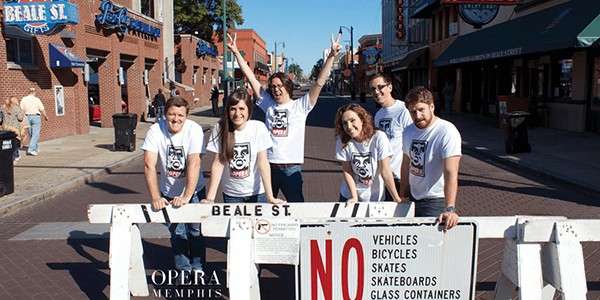
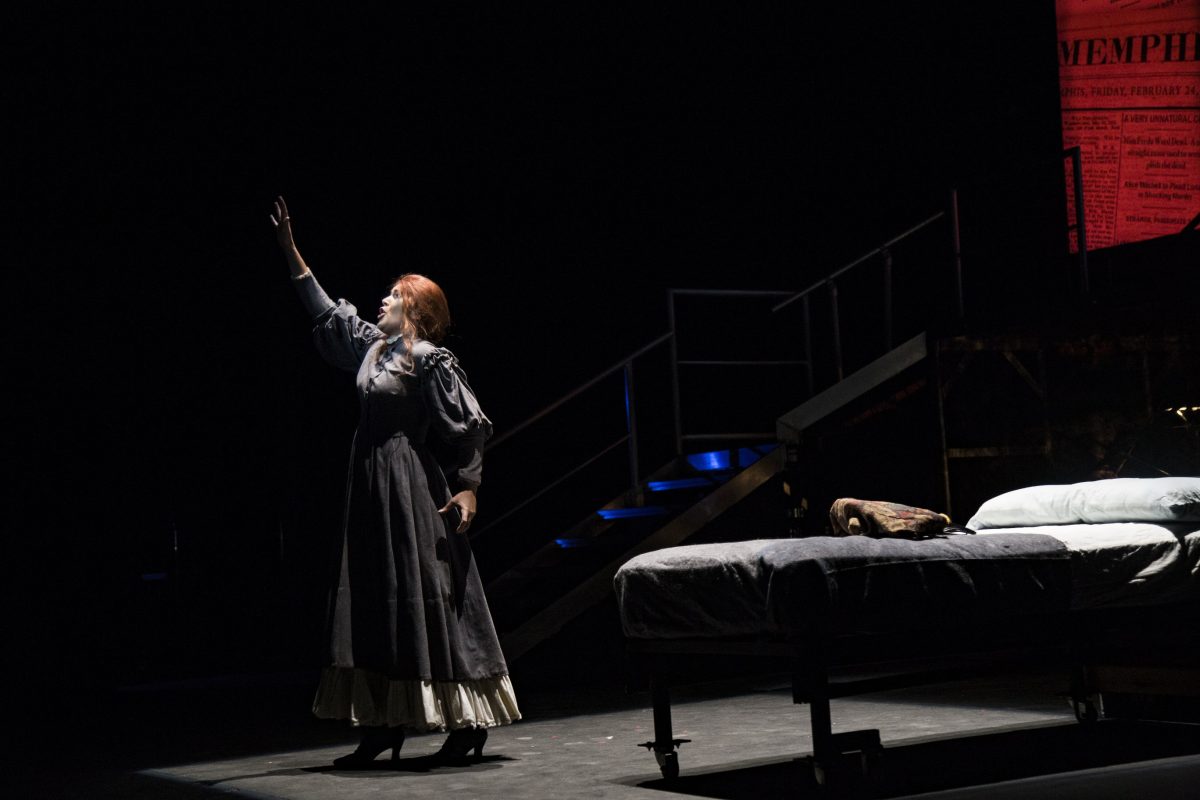
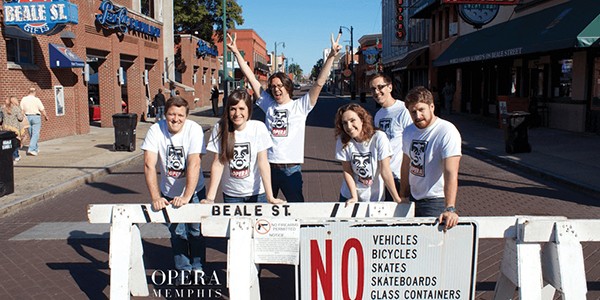
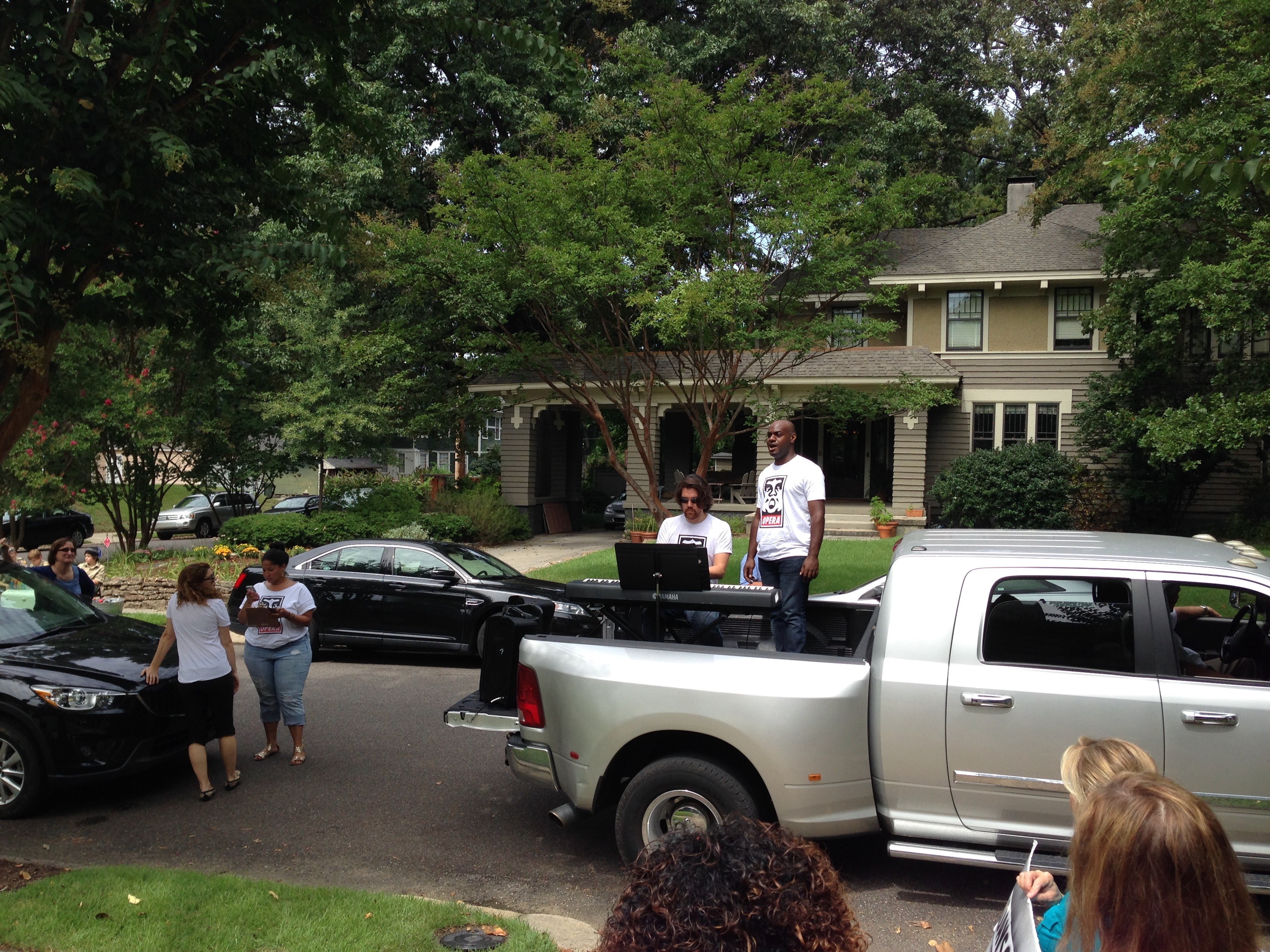
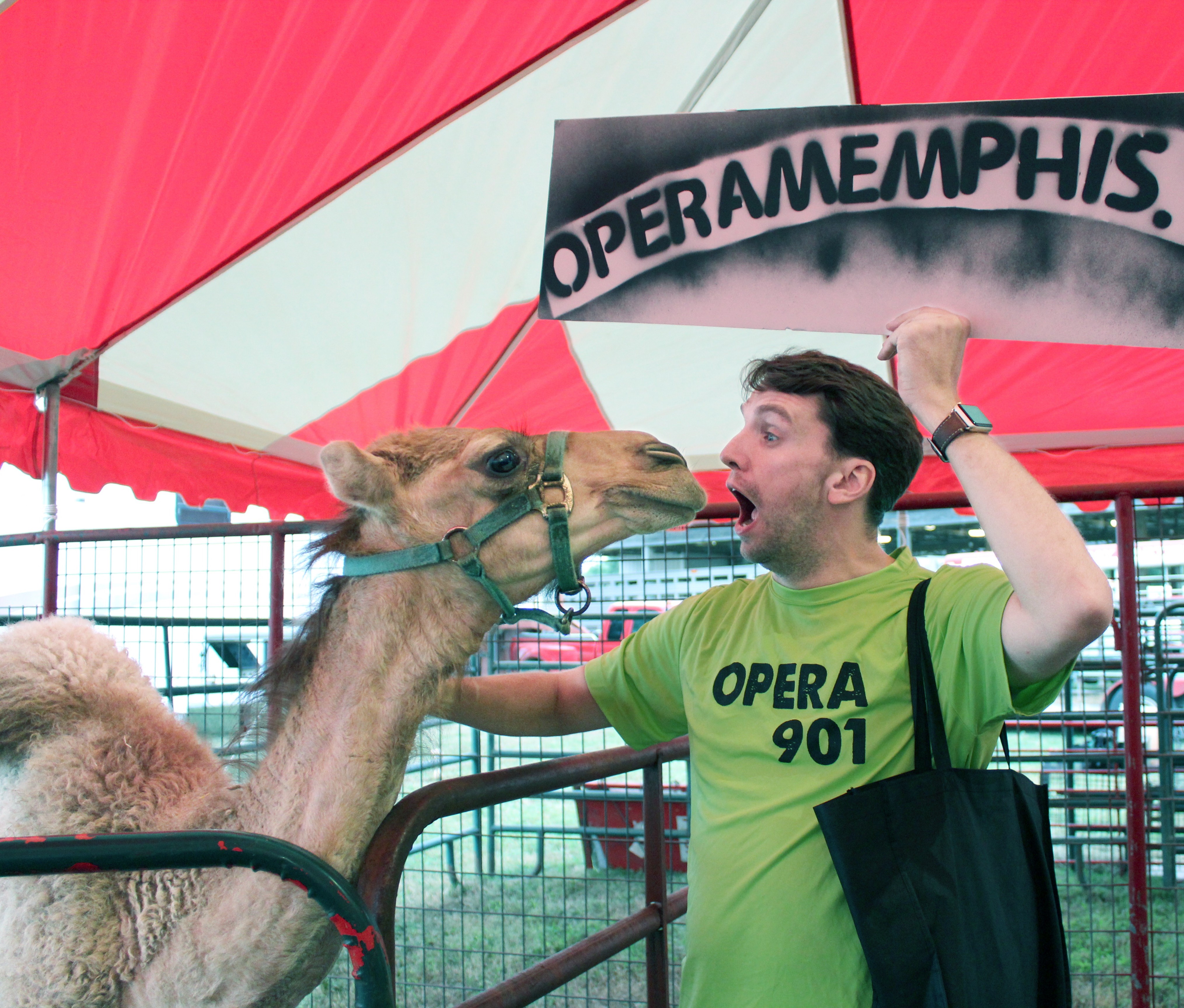 Jillian Barron
Jillian Barron 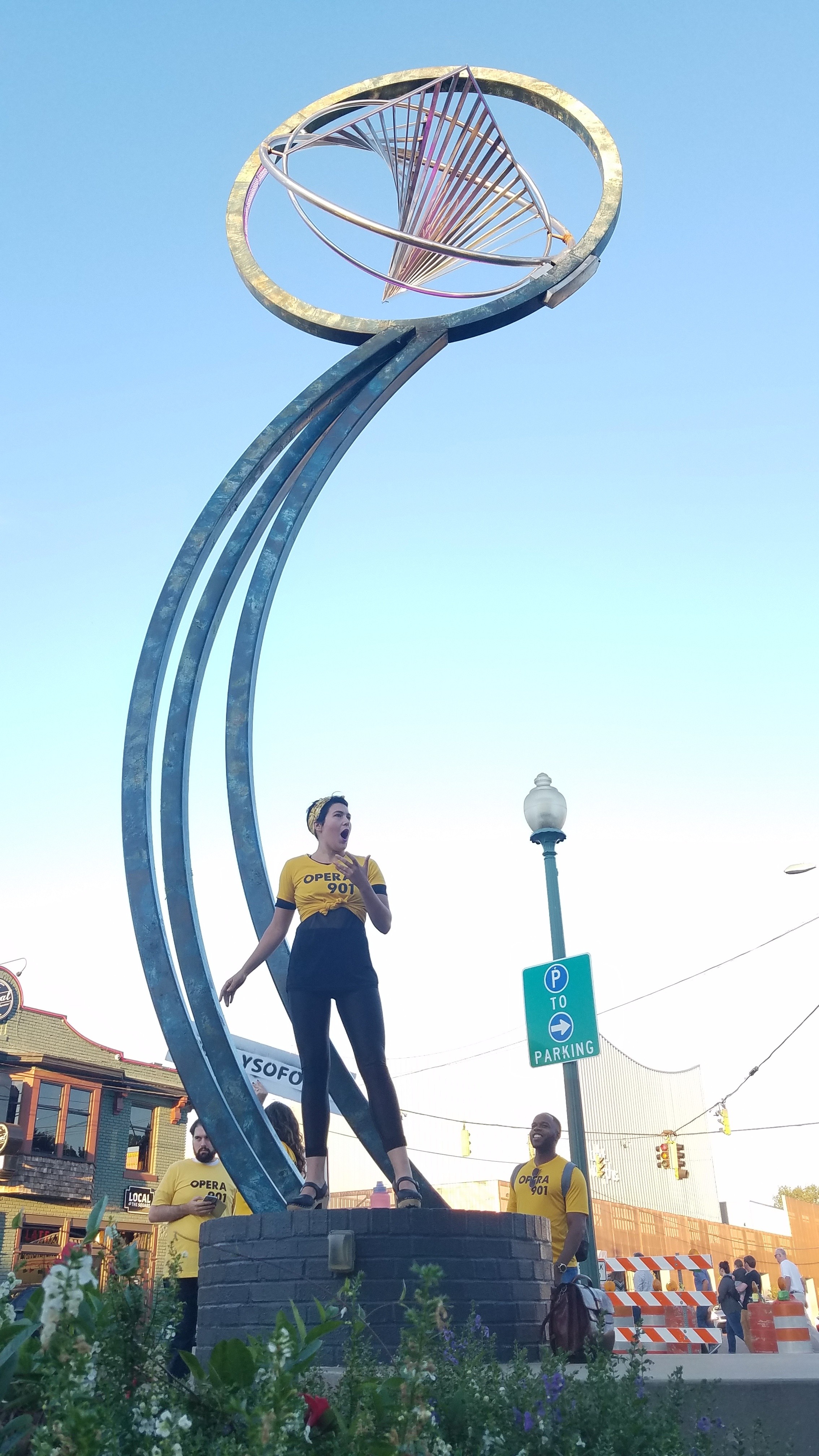 Opera Memphis
Opera Memphis 